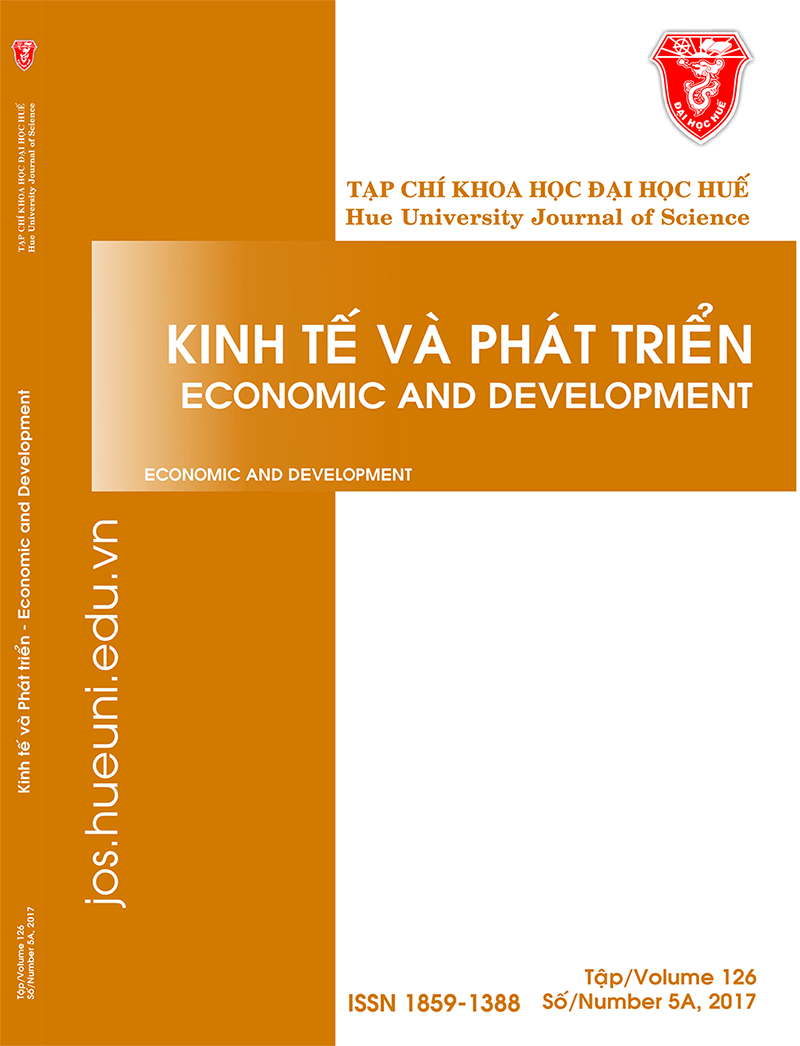Abstract
Nghiên cứu này xem xét sự tác động của các yếu tố đến sự hài lòng trong công việc của những người đã từng du học hoặc làm việc ở nước ngoài và hiện đang làm việc tại tỉnh Thừa Thiên Huế. Nghiên cứu được thực hiện trên cơ sở khảo sát 187 mẫu điều tra dựa vào phương pháp chọn mẫu phát triển dần (snowball sampling). Kết quả nghiên cứu đã chỉ ra rằng các yếu tố liên quan sự gắn kết công việc, sự tái thích nghi công việc là nguyên nhân trực tiếp, các yếu tố thuộc về tổ chức như chính sách nhân sự hướng đến việc sử dụng, phát huy kiến thức, kỹ năng nhân viên và môi trường làm việc là những nguyên nhân gián tiếp ảnh hưởng sự hài lòng công việc của họ thông qua sự gắn kết công việc và sự tái thích nghi công việc.
References
- La Đình Mão (2013), Phát triển nguồn nhân lực công vụ ở Thừa Thiên - Huế, Tạp chí Tổ chức Nhà nước, 6, 23-26.
- Alberts, Heike C, Hazen, Helen D. (2005), “There are always two voices…”: International Students' Intentions to Stay in the United States or Return to their Home Countries, International Migration, 43, 131-154.
- Black, J. Stewart (1994), O Kaerinasai: Factors Related to Japanese Repatriation Adjustment, Human Relations, 47(12), 1489-1508.
- Gould-Williams, J. (2007), ‘HR practices, organizational climate and employee outcomes: evaluating social exchange relationships in local government’, International Journal of Human Resource Management, 18, 1627-1647
- Greenhaus, Jeffrey H Parasuraman, Saroj Wormley, Wayne M (1990), Effects of race on organizational experience, job performance evaluations, and career outcomes, Academy of Management Journal, 33(1), 64-86
- Hoppock.R (1935), Job Satisfaction, New York: Haper and Bros, 47.
- Locke,E.A. (1976). The nature and causes of job satisfaction. In M.D. Dunnette (Ed.), Handbook of industrial and organizational psychology, Chicago: Rand McNally, 1, 1297-1343.
- Lin & Liu (2016), High performance work systems and organizational service performance: The roles of different organizational climates, International Journal of Hospitality Management 55 (2016), 118–128
- Phyllis Tharenou, Natasha Caulfield (2010), Will I Stay or Will I Go? Explaining Repatriation by Self-initiated expatriates, Academy of Management Journal, 53(5), 1009-1028.
- Quinn, R. P., & Staines, G. L. (1979). The 1977 Quality of Employment Survey, MI: Institute for Social Research, USA.
- Smith el al (1983), Organizational citizenship Behavior: Its Nature and antecedent, Journal of Applied Psychology, 68, 653– 663.
- Suutari, V., & Valimaa, K. (2002). Antecedents of repatriation adjustment: New evidence from Finnish repatriates. International Journal of Manpower, 23(7), 617-634.
- Tung, R.L. (2007), The human resource challenge to outward foreign direct investment aspirations from emerging economies: the case of China, The International Journal of Human Resource Management, 18(5), 868-889.
- Vroom, V. (1964). The motivation to work. New York: John Wiley, USA.
- Wadhwa, V., Saxenian, A.L., Freeman, R., Gereffi, G., Salkever, A. (2009), America’s Loss is the World’s Gain: America’s New Immigrant Entrepreneurs, Ewing Marion Kauffman Foundation, USA.
- Weiss, D. J. , Dawis, R. V. England, G. W. and Lofquist, L. H. (1967), Manual for the Minnesota Satisfaction Questionnaire, Minnesota Studies in Vocational Rehabilitation, 22.
